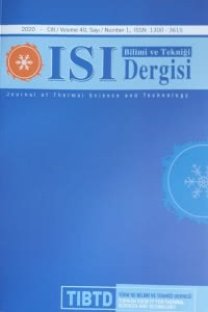Influence of upper layer properties on the ground temperature distribution
Üst katman özelliklerinin toprak sıcaklığına etkisi
___
- ASHRAE Handbook Fundamentals, American Society of Heating Refrigeration and Air-Conditioning Engineers, Inc, 6.3-6.4, 2003.
- ASHRAE Handbook Fundamentals, American Society of Heating Refrigeration and Air-Conditioning Engineers, Inc, 29.15, 2003.
- Beltrami, H., On the relationship between ground temperature histories and meteorological records: A report on the Pomquet station, Global and Planetary Change 29, 327–348, 2001.
- Best, M. J., A model to predict surface temperatures, Boundary-layer meteorology 88, 279–306, 1998.
- El-Din, M. M. S., On the heat flow in to the ground, Renewable Energy 18, 473-490, 1999.
- First development report of The Scientific and Technological Research Council of Turkey (TUBITAK) project, Project No: 107M380, 2008.
- Mihalakakou, G., Santamouris, M. and Asimakopoulos, D., Modeling the earth temperature using multiyear measurements, Energy and Buildings 19, 1-9, 1992.
- Mihalakakou, G., Santamouris, M., Lewis, J. O. and Asimakopoulos, D. N., On the application of the energy balance equation to predict ground temperature profiles, Solar Energy 60, 181-190, 1997.
- Mihalakakou,G., On estimating soil surface temperature profile, Energy and Buildings 34, 251-259, 2002.
- Piechowski, M., Heat and mass transfer model of a ground heat exchanger: Validation and sensitivity analysis, Int. J. Energy Res. 23, 571-588, 1999.
- Qin, Z., Berliner, P. and Karnieli, A., Numerical solution of a complete surface energy balance model for simulation of heat fluxes and surface temperature under bare soil environment, Applied Mathematics and Computation 130, 171–200, 2002.
- Rees, S. W., Zhou, Z. and Thomas, H. R., Ground heat transfer: A numerical simulation of a full-scale experiment, Building and Environment 42, 1478–1488 2007.
- Second development report of The Scientific and Technological Research Council of Turkey (TUBITAK) project, Project No: 107M380, 2008.
- ISSN: 1300-3615
- Yayın Aralığı: 2
- Başlangıç: 1977
- Yayıncı: TÜRK ISI BİLİMİ VE TEKNİĞİ DERNEĞİ
Arif Emre ÖZGÜR, Hilmi Cenk BAYRAKÇI, Ali Ekrem AKDAĞ
Dikdörtgen Bir Tank İçerisinde Yatay Bir Boru Etrafındaki Buz Oluşumu
Ahmet FERTELLİ, Orhan BÜYÜKALACA, Alper YILMAZ
Ali Ekrem AKDAĞ, Arif Emre ÖZGÜR, Hilmi Cenk BAYRAKÇI
Çileklerın Dondurarak Kurutma Davranışlarının Yapay Sınır Ağları Kullanılarak Modellenmesı
Tayfun MENLİK, Volkan KIRMACI, Hüseyin USTA
Influence of upper layer properties on the ground temperature distribution
Alper YILMAZ, Tuncay YILMAZ, Arif ÖZBEK, Orhan BÜYÜKALACA
The effects of laser energy deposition on supersonic cavity flow
Selin ARADAĞ, Doyle KNIGHT, Hong YAN
Türkiye’nin Net Elektrik Tüketiminin Tahmini
Farklı Soğutucular Kullanarak CPU’nun Isı Boruları ile Soğutulması
İsak KOTCİOĞLU, Sinan ÇALIŞKAN, Eyüphan MANAY
Lazer Enerjisinin Sesüstü Kavitelerdeki Akış Üzerine Etkileri
